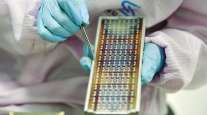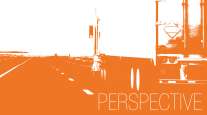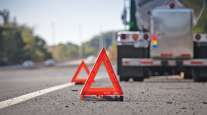Senior Reporter
Uber Suspends Autonomous Truck Testing After Arizona Pedestrian Death Involving Car

Uber is temporarily suspending its autonomous vehicle operations — including trucks — in the wake of an accident with one of its autonomous cars that resulted in a fatality, the company confirmed March 19 to Transport Topics.
The autonomous car accident occurred March 18 in Tempe, Ariz., when a passenger vehicle being driven autonomously struck and killed a woman in a crosswalk at approximately 10 p.m. local time. A human backup driver was in the vehicle at the time of the accident, according to Tempe police.
It is believed to be the first highway fatality ever involving a pedestrian struck by an autonomous vehicle on a public road.
Since November 2017, Uber has been sending autonomous trucks on delivery runs across Arizona with a licensed driver in the cab.
The National Transportation Safety Board said it is sending a group of experts from its highway safety division to Arizona to investigate the accident.
Last September the U.S. House of Representatives easily passed legislation setting up the regulatory framework for the testing and eventual widespread use of autonomous cars and trucks. But a similar piece of legislation is stalled in the U.S. Senate.
“We won’t have all the facts until relevant investigations are complete, but this tragedy underscores the need to adopt laws and policies tailored for self-driving vehicles," said Sen. John Thune (R-S.D.) in a statement obtained by Transport Topics. "Congress should act to update rules, direct manufactures to address safety requirements, and enhance the technical expertise of regulators.”
The 49 year-old woman, Elaine Herzberg, was crossing the road outside of a crosswalk when the Uber vehicle operating in autonomous mode under the supervision of a human safety driver struck her, according to the Tempe Police Department. She was transferred to a local hospital where she died from her injuries. "Uber is assisting and this is still an active investigation," Liliana Duran, a Tempe police spokeswoman, said in an emailed statement.
In an exclusive interview with the San Francisco Chronicle, Tempe police chief Sylvia Moir said that a preliminary investigation indicates Uber will likely not be found at fault. Moir said Herzberg was pushing a bicycle laden with shopping bags.
Moir said police have video of the accident and told the Chronicle, “it’s very clear it would have been difficult to avoid this collision in any kind of mode (autonomous or human-driven) based on how she came from the shadows right into the roadway.”
The self-driving Volvo SUV, outfitted with cameras, was travelling 38 mph in a 35 mph zone at the time of the accident, according to the Chronicle, which cited the police department's preliminary investigation.
Uber said on March 19 that it was pausing tests of all its autonomous vehicles in Pittsburgh, San Francisco, Toronto and the greater Phoenix area. “Our hearts go out to the victim’s family," a company spokeswoman said in a statement. "We are fully cooperating with local authorities in their investigation of this incident."
As many self-driving cars have begun to travel on public roads in pilot programs around the world, the chance of a pedestrian death has become more likely. Experts have long worried about the impact deadly crashes could have on the nascent industry.
"We’re within the phase of autonomous vehicles where we’re still learning how good they are. Whenever you release a new technology there’s a whole bunch of unanticipated situations," said Arun Sundararajan, a professor at New York University’s business school. "Despite the fact that humans are also prone to error, we have as a society many decades of understanding of those errors."
It is unclear how, and if, the accident will slow the testing and eventual deployment of more autonomous vehicles.
“I think it is too early to tell, because we don’t know the particulars. If this was unavoidable, according to the police, it should not cause a pause in testing,” according to Richard Bishop of Bishop Consulting, who spoke to Transport Topics. Bishop is an industry analyst and expert on intelligent, connected and autonomous vehicles. “If it’s at fault, I can’t predict all of the effects. But it will cause a slowing, more cautious approach.
In addition to NTSB, the Department of Transportation’s National Highway Traffic Safety Administration dispatched a special crash investigation team.
Some incredibly sad news out of Arizona. We’re thinking of the victim’s family as we work with local law enforcement to understand what happened. https://t.co/cwTCVJjEuz — dara khosrowshahi (@dkhos) March 19, 2018
The NTSB opens relatively few highway accident investigations each year, but has been closely following incidents involving autonomous or partially autonomous vehicles. Last year, it partially faulted Tesla Inc.’s Autopilot system for a fatal crash in Florida in 2016.
The NTSB’s cautionary tone on the emergence of self-driving technology contrasted with DOT, which revised its policy on self-driving vehicles March 13 in an attempt to remove obstacles to the testing of such vehicles.
"As always we want the facts, but based on what is being reported this is exactly what we have been concerned about and what could happen if you test self-driving vehicles on city streets," said Jason Levine, executive director of the Center for Auto Safety, a Washington-based advocacy group. "It will set consumer confidence in the technology back years if not decades. We need to slow down."
The Phoenix area is a fertile ground for experiments in the technology. Uber has been testing there with safety drivers behind the wheel. Late last year, Alphabet Inc.’s Waymo, which has tested in the Phoenix area for years, began removing the safety drivers to transport a small number of residents. (Waymo staff sit in the back seat.) General Motors Co. is also testing in the Phoenix area. A GM spokesman declined to comment, and a representative from Waymo did not return multiple requests for comment to Bloomberg News.
"Public safety is our top priority, and we are in communication with law enforcement, which is investigating the accident and gathering facts, as well as Uber," a spokesman for Arizona Gov. Doug Ducey said.
Drivers relying on Tesla’s Autopilot technology have been involved in fatal car crashes. Uber has had minor incidents in the past. A self-driving Uber car ran a red light in San Francisco while the company operated in the city without regulatory approval. The California Department of Motor Vehicles eventually forced Uber to pull the cars from the road.
Contributing: Mark Bergen of Bloomberg News, with assistance by Alan Levin and Ryan Beene




